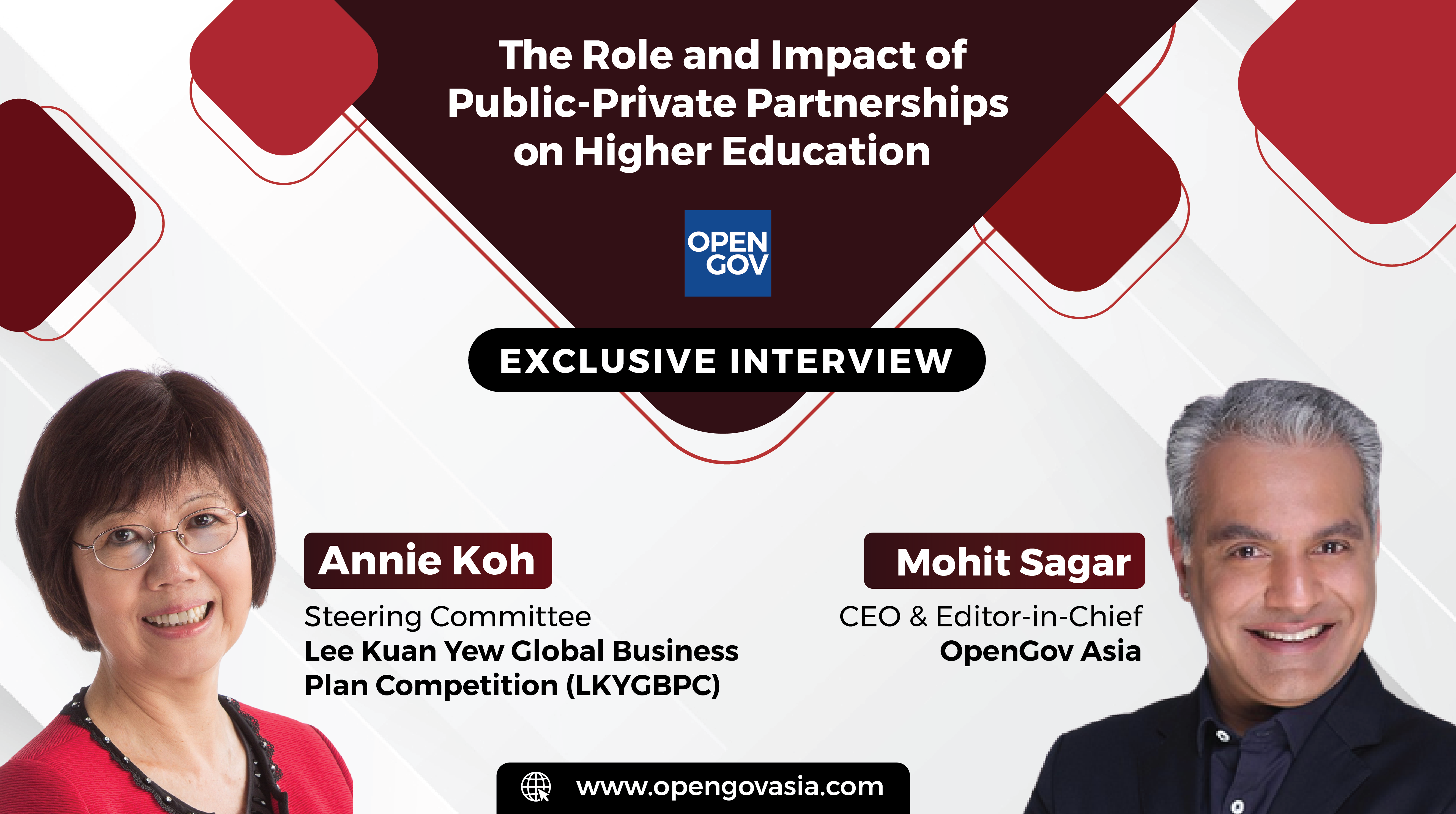
Public-Private Partnerships (PPPs) in education have the potential to enhance how education is provided, financed, and managed as well as offer easier access to the community.
A PPP system operates under the construct that market mechanisms, in conjunction with government inputs, are better for providing education. One of the rationales behind PPPs, which are supported by international organisations, development agencies and academics, is that competition between public and private education providers is a good way to improve the quality and efficiency of education.
PPP policy frameworks should therefore create real market dynamics in which education service providers continue to innovate and improve the quality of their services to attract learners, young and old, who are seen as benefit maximisers and well-informed consumers.
New Era of Partnerships, Building Talent Pipeline
 In an exclusive interview with Mohit Sagar, CEO and Editor-in-Chief of OpenGov Asia, Annie Koh, Steering Committee, Lee Kuan Yew Global Business Plan Competition (LKYGBPC) elaborated on how public-private partnerships in higher education create effective degree programmes.
In an exclusive interview with Mohit Sagar, CEO and Editor-in-Chief of OpenGov Asia, Annie Koh, Steering Committee, Lee Kuan Yew Global Business Plan Competition (LKYGBPC) elaborated on how public-private partnerships in higher education create effective degree programmes.
“The structure and framework for any university to launch degree programmes can be fairly onerous, given the emphasis on quality assurance and relevance,” says Annie who is also a Professor Emeritus of Finance (Practice), Lee Kong Chian School of Business and Senior Advisor at the Business Families Institute in Singapore Management University (SMU).
However, academic-industry partnerships play a crucial role in building the future of students and facilitating the transition of young people from school to work. Students need to be exposed to a variety of jobs and workplaces to develop interest and discover where their studies and passion may lead.
Industry partnerships with different sectors offer a variety of experiences, such as simulated job interviews, career development activities, challenge-based learning projects, curriculum-aligned activities, and work-study programmes. In addition, internships have become a vital opportunity for candidates to distinguish themselves prior to full-time employment.
A PPP is mutually beneficial, allowing industry access to fresh talent and looking at the industry’s challenges from the perspective of future consumers or employees acknowledges Annie. In fact, the private sector has indicated to all institutions that they need future talent in the area of data analytics, so SMU has recently launched a track in data analytics hosted in both their business school and computer and info systems school so universities also benefit from the insights from the industry to stay relevant in our curricula.
With the help of data analytics tools, a company may take unstructured raw data and use this information to discover patterns, draw conclusions and turned into useful insights. Therefore, data analysis aids businesses in so many ways, including making educated judgments, developing a more successful marketing plan, enhancing the customer experience and streamlining processes.
Education is not only under the charge of the Ministry of Education but also needs the support of other ministries since future jobs and capacity building are expected of the Ministries of Trade and Industry, Finance, Maritime, Health and others. Partnering with the whole of government allows for students’ skillsets to be increased and all students become more relevant, valuable and workplace ready.
Prof Annie knows that no one has a monopoly on knowledge, and no one knows the exact skills which will be needed in the future. Thus, PPPs have the most value when it forms a part of “lifelong learning.”
The exciting thing about lifelong learning, Annie believes “…is that when you get your degree, you think you’re done, but you’re just getting started. Even as you gain experience and learn on the job, you’ll need to keep reinventing yourself and the skills needed to extend your runway will keep changing.”
Passion extends beyond degrees and ongoing learning is a crucial element to keep employees engaged That’s why higher education now permits a variety of pathways to marry passion with career aspirations and is no longer a paper chase, she explains.
Two good cases to illustrate the value of PPP in the context of SMU’s innovative programmes that Prof Annie is very proud of are the partnership approach in launching the International Trading track and the Maritime Business Operations track under the Finance and Operations majors in SMU’s business school.
In accordance with the creation of a strong Singaporean core, wholesale trade and maritime businesses have been focusing on both skillset development and attracting new talent supply to ensure a pipeline of sustainable human capital. So, the trading and maritime sectors do need to build a case for making the jobs in their sectors more appealing – particularly with the assistance of government grants and scholarships.
Companies can play a crucial role by showing how an organisation can provide a feeling of purpose with support and development opportunities available to make building a career in their organisations appealing and attractive to the candidate
A part of Annie’s challenge in the early days was to set up an International Trading Institute (ITI) where students could take for-credit classes under the business school and get a certificate of completion for the non-credit practice-oriented sessions, learning from practitioners in the evenings.
“My goal at SMU is to link external relevance to internal degree requirements while upholding the quality assurance requirements of the education system. Different industry partners help us with this mission to co-create and deliver the applied learning content with us.”
SMU is therefore a strategic asset for the country and both the tracks had, over the last decade, created a pool of more than 300 alumni who are knowledgeable about wholesale trading, largely in the commodities trading space and maritime operations. Now, there is available talent who are able to speak and work with more confidence up and down the trade value chain and contribute to Singapore’s relevance as a trade and maritime hub.
Another great example of PPP was manifested during the last three years of the COVID-19 crisis which saw a spate of job cuts and many experienced PMETs were laid off. Annie worked with her teams at ITI and BFI to design a nine-month Business and Digital Transformation programme which combined in-class training modules with a capstone project for candidates who are matched to SMEs to also deliver a project for these sponsoring companies. Candidates have a chance to learn and apply the knowledge and sponsoring companies also benefit from the capstone projects delivered. In addition, 70% to 90% of the programme fees are supported by SSG grants, while WSG grants provide funding support towards the candidates’ commensurate salaries.
All these partnerships were possible because a pool of companies is available and can be accessed to match the candidates as a result of SMU’s external network of trusted companies, which was strengthened by the BFI that Annie had set up 10 years ago with the support of SMU’s senior leadership. Many of Asia’s SMEs are family owned with different sets of challenges and aspirations other than the usual business issues. In addition, many of these business families have longer horizons and they are the ones that countries depend on to build businesses sustainably as they think beyond current generations.
Therefore, business families with an entrepreneurial spirit, not only make money but also contribute to changing the world through their businesses and other new ventures, including building social enterprises and philanthropic activities.
By addressing business family-specific issues such as succession, family governance, entrepreneurship and wealth management, BFI aims to strengthen the ecosystem of entrepreneurial business families and stakeholders in their creation of sustainable impact by leveraging SMU’s core competence as a thought leader. In turn, BFI has been a strong partner to the LKYGBPC. Many of LKYGBPC’s sponsors are family-owned businesses, such as Wilmar International and Frasers.
In addition, many of these family enterprises have footprints beyond Singapore and are always on the lookout for quality start-ups to invest in or be part of their accelerator programmes. Innovation is essential for a company to improve its operations, introduce new and enhanced products and services to the market, raise its efficiency, and most crucially, boost its profitability.
Annie feels that her journey in academia is more about building entrepreneurship and Technology, Talent and Trust (3Ts) are important drivers in helping companies in their transformation journeys. As such, public-private-people partnerships are even more relevant in today’s challenging and uncertain times to build back better and broader for everyone.
According to Annie, the road to digital and business transformation success is paved with courageous actions by caring and forward-looking leaders. The right leaders will build a firm sustainably and attract the right people, the right leaders will inspire and motivate the right people to learn, improve and grow.
“Developing people is my calling but learning to develop people is everyone’s responsibility. And because the world is bigger than yourself, you need to be big-hearted, purpose-oriented, and have an open mind to be successful on any path you choose,” Annie concludes.
















